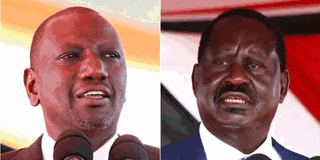Premium
Independents a threat to Raila, Ruto majority government plans

Deputy President William Ruto and ODM leader Raila Odinga.
What you need to know:
- Many losers claim they were rigged out by people close to Ruto and Raila in the UDA and ODM polls.
- Some allege that their rivals were given direct tickets based on fake and suspicious opinion polls.
A majority of aspirants who lost out on party tickets during the hotly contested primaries have vowed to run as independents in the August 9 polls, a move that could hurt the major coalitions.
Many losers claim they were rigged out by people close to the leading presidential contenders, Deputy President William Ruto of Kenya Kwanza Alliance and Azimio la Umoja One Kenya’s Raila Odinga.
Some allege that their rivals were given direct tickets based on fake and suspicious opinion polls.
In the 2017 General Election, many independents won after voters rejected politicians that had been forced down their throats by the National Super Alliance and Jubilee.
Political analysts now caution the big parties to be wary of the rising number of independents as they are likely to dash their hopes of winning most seats in the Senate, the National Assembly, the Council of Governors and the county assemblies.
The presence of independents in regions dominated by certain parties – such as Nyanza by ODM and Rift Valley by UDA – means that party candidates will have to work harder, especially those who secured tickets under a cloud of controversy.
It could, however, be a blessing, in some cases, as such contests lead to high voter turnouts, often to the advantage of the presidential candidate holding sway in a region.
“One should not assume that because you’ve secured either the UDA or ODM ticket, it will be an automatic win on August 9. The good thing is that these independent candidates are very strong, because they also support the popular presidential contender in their regions,” said Prof Masibo Lumala of Moi University.
“Their survival depends on the candidate they are supporting at the national level. They can upset the big parties in regions where primaries were shambolic.”
To avoid embarrassment on the ballot, Mr Odinga on Monday called for a “six-piece” voting pattern in his backyard of Nyanza for stability in government should he win the presidency.
“While I have committed to taking the bull by the horns at the national level, I ask you to vote six-piece for ODM from the MCA to the presidency for us to have the required numbers,” he said.
In 2017, there were 4,002 independents, compared to just 350 in 2013. The House had 13 independent members—the fourth largest group after Jubilee, ODM and Wiper, respectively. Mr Musalia Mudavadi’s ANC had 12, while Moses Wetang'ula’s Ford Kenya had 10.
Of the 13, six claimed they had been rigged out in nominations by either Jubilee or the National Super Alliance. They are Mohamed Ali (Nyali), John Paul Mwirigi (Igembe South), Kawira Mwangaza (Meru County), Patrick Wainaina (Thika Town), Janet Sitienei (Turbo) and Peter Masara (Suna West).
In the 1,450 wards, independent winners were the third largest group at 109, only beaten by Jubilee’s 582 and ODM’s 339. Laikipia Governor Ndiritu Murithi, Isiolo’s Mohamed Kuti and Kirinyaga Senator Charles Kibiru were also elected as independents.
Former Nairobi Governor Evans Kidero, who will be running as an independent in Homa Bay, is already giving ODM gubernatorial nominee Gladys Wanga a hard time on the campaign trail.
In the Embu senatorial race, Senator Njeru Ndwiga has ditched the UDA after losing in the primaries to Deputy Governor David Kariuki.
Comedian Jasper Muthomi, alias MC Jessy, has also ditched UDA, days after he was asked to step down in favour of his opponent, Mwiti Kathaara, for the South Imenti parliamentary seat.
In the Kiambu gubernatorial race, Thika Town MP Wainaina, alias Jungle, lost in the UDA nominations to Senator Kimani Wamatangi. He is considering running as an independent.
“I want to assure my supporters and the people of Kiambu in general that my name will be on the ballot. My record speaks for itself on matters of development and service delivery,” Mr Jungle said on Monday.
In the Uasin Gishu gubernatorial race, businessman Bundotich Zedekiah Kiprop, aka Buzeki, will run as an independent against UDA’s Jonathan Bii. Mr Buzeki has the financial muscle to put up a spirited fight as long as his 2017 voting bloc remains in place.
In Moiben, area MP Silas Tiren, who is the chairperson of the Agriculture Committee in the National Assembly, will face off with a UDA candidate, who is to be announced today.
Mr Tiren has been on the frontline of championing better prices of farmers’ produce and reduced cost of farm input. He enjoys cordial relationship with President Uhuru Kenyatta.
Kesses MP Swarup Mishra faces a tough battle defending his seat after siding with Mr Kenyatta’s team during the purge of Dr Ruto’s allies from House seats.
In the Bomet senatorial race, incumbent Christopher Lang’at and nominated MP Wilson Sossion lost in UDA nomination to lawyer Hillary Sigei.
“In the event that many of the independent candidates are elected, it will demonstrate that the big parties did not run free and fair primaries, and this is a threat to internal party democracy,” said governance expert Javas Bigambo.
Mr Tom Mboya, a lecturer at Maseno University, said presidential hopefuls will have to win over the independents.





